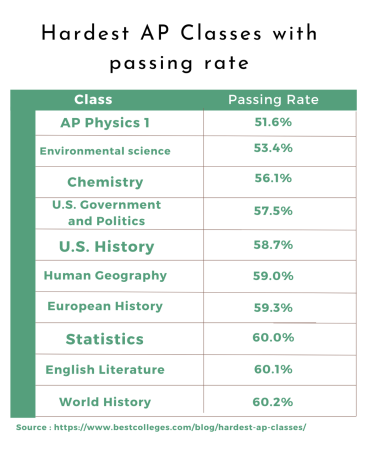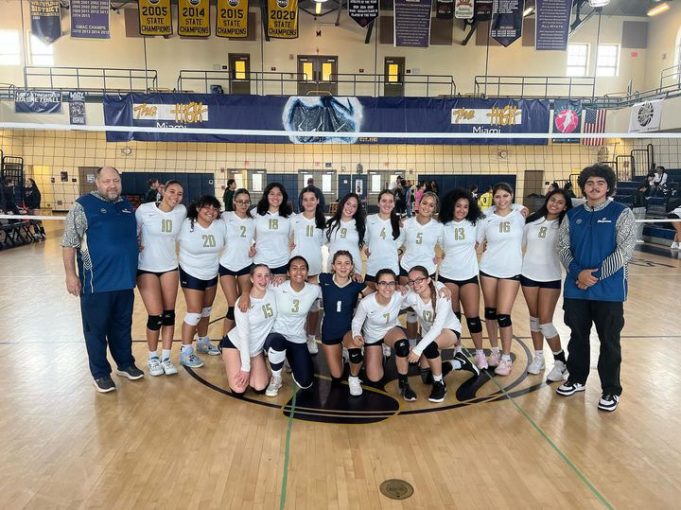Classes to Success!
April 25, 2023
Every student moves at their own pace and path to success. Some students in Miami Senior High on the fast track take either Advanced Placement (AP) or Dual Enrollment (DE) classes.
Junior Gabriela Tabata, who takes AP Biology, AP Capstone Seminar, and AP Calculus AB, says, “The workload can sometimes be heavy because we have presentations, AP classwork, and exams we have to study for.”
On the other hand, junior Jaime Acosta, who is taking AP Capstone Seminar and AP Psychology, says, “The workload for each of these classes isn’t heavy at all. For example, for Psychology we have vocabulary for every unit, and it’s due whenever we take our test. The vocabulary is normally 60-70 words which may seem like a lot, but we have 2 weeks or more to do them in between each unit.”
Advising students to these classes
Teachers and counselors recommend students for AP classes. Junior Melissa Riguero, who is taking AP Seminar and AP Biology, mentioned, “Dr. Yoham advised me to take his AP Biology class. I did well in biology honors so he thought I would do good in AP Bio as well. He knows I’m a student who enjoys Biology.”
Some seniors and juniors with AP or DE experience also take it upon themselves to provide underclassmen with insight of these classes. Gabriela said, “A lot of my senior friends told me to take AP Biology because, though it’s hard, I want to go into the field of stem especially biology. If I take it and pass the final exam it’ll look really good on my college applications, and over all it’s a good class to learn about.”
Workload of an AP class
The amount of work for an AP/DE class is much harder than regular classes. That’s why only some students sign up for them. Junior Kelvin Miranda, who takes AP Physics, AP Research, AP English Language, as well as DE Basic Taxation, mentioned, “Yes, the workload is heavy. But it is only because the exam is heavy with content. It is important to hone our skills in order to get a shot at passing the exam.”
Preparing for AP classes
Before some students take an AP or DE course, they learn the content from a regular or honors class. Gabriela mentioned, “Last year I took biology honors where you learn the basics of biology and that prepared me for AP Biology which is just a more in-depth complex version of what we learned in regular biology.”
Jaime Acosta said, “I think the only course I took in preparation for AP Seminar was English, but that’s kind of given. I didn’t take anything in preparation for AP Psych.”
Teachers Input
Mr. Arevalo, who teaches AP English Language, said, “Advanced Placement (AP) classes help students by preparing them for college-level coursework during high school. Students take an AP Exam at the end of the school year to demonstrate their mastery of course content and can earn college credit, with qualifying scores of 3, 4, or 5 on the exam. AP courses also affect admission into college. Colleges want to see that students are challenging themselves with the most rigorous courses available to them at their high school, and that they are succeeding in these courses,” he said.
Mr. Padilla, who teaches DE Taxation, said,” Students can get acquainted with rigorous classes in a college level. It helps because these classes are a little bit more labor intensive and time consuming than regular classes. So, students start to get accustomed to that kind of work which is what you’re exposed to in college.”
Ms. Wong, who teaches AP Computer Science and AP Statistics, said, “These classes expose students to different fields.”
Mr. Cuevas, student services department chair, also mentioned, “Both of these classes are hard and are weighted the same. It just depends what the students’ goals are whether AP or DE classes are more convenient for them. Mr. Cuevas said “AP courses do not affect your college GPA but DE courses do. A ‘D’ is not a passing course in college for DE courses. Although you will receive high school credit for the ‘D’, you will not receive college credit.”






